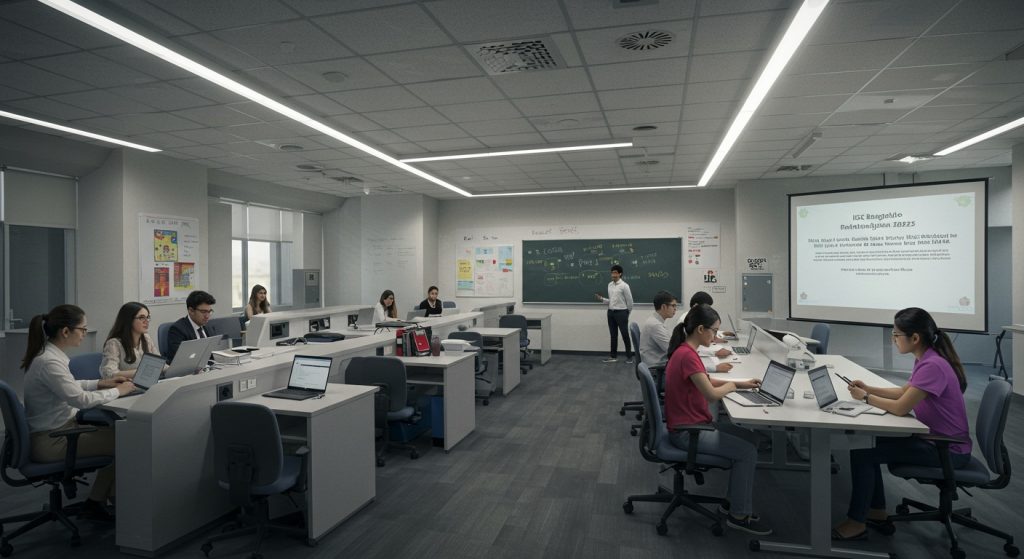Dreaming of launching a startup but unsure where to begin? IISc Bangalore offers a fertile ground for innovation. Navigating its ecosystem can feel overwhelming. We’ll demystify this process, highlighting how you can leverage IISc’s resources – from cutting-edge research to mentorship networks – to transform your idea into a viable venture. Discover how recent policy changes favoring deep-tech startups and increased seed funding opportunities within the institute can be strategically utilized. Learn how to access specialized labs, collaborate with world-renowned faculty. Tap into the alumni network’s invaluable entrepreneurial experience to accelerate your startup journey from ideation to market validation.

The Vibrant Heart of Innovation: IISc Bangalore’s Ecosystem
IISc Bangalore, the Indian Institute of Science, is more than just an academic institution; it’s a thriving innovation hub. This ecosystem nurtures groundbreaking ideas and transforms them into impactful startups. It’s a place where cutting-edge research meets entrepreneurial ambition, providing a fertile ground for innovation across various disciplines. Understanding this ecosystem is key to unlocking the potential for aspiring entrepreneurs looking to build their startups within or in collaboration with IISc.
Key Components of the IISc Innovation Ecosystem
The IISc innovation ecosystem is multifaceted, comprising several interconnected components that support the journey from idea to market. These components include:
- Research and Development (R&D) Infrastructure: State-of-the-art labs, equipment. Research centers covering a wide spectrum of scientific and engineering domains.
- Faculty Expertise: Access to world-renowned faculty members who are experts in their respective fields and provide mentorship and guidance.
- Intellectual Property (IP) Support: Mechanisms for protecting and commercializing inventions and discoveries made at IISc.
- Incubation Centers and Accelerators: Dedicated spaces and programs that provide startups with resources, mentorship. Funding opportunities.
- Industry Partnerships: Collaborations with leading companies and organizations to facilitate technology transfer and market access.
- Alumni Network: A vast network of successful entrepreneurs, investors. Industry leaders who can provide valuable connections and support.
- Funding Opportunities: Access to various funding sources, including venture capital firms, angel investors. Government grants.
Navigating Intellectual Property (IP) at IISc
Intellectual Property is a crucial aspect of any startup journey, especially when originating from a research institution like IISc. Understanding the IP landscape and how it’s managed is essential.
What is Intellectual Property? IP refers to creations of the mind, such as inventions, literary and artistic works, designs. Symbols, names. Images used in commerce. Common types include patents, copyrights, trademarks. Trade secrets.
IISc’s IP Policy: IISc has a well-defined IP policy that governs the ownership, management. Commercialization of IP generated by its researchers. Generally, the IP ownership resides with IISc. The policy also outlines the rights and benefits for the inventors. The policy is designed to incentivize innovation while ensuring the institute’s interests are protected.
Commercialization Process: The process typically involves disclosing the invention to the IISc’s technology transfer office, which assesses its commercial potential. If deemed viable, the office works with the inventors to file for patent protection and explore licensing opportunities. Startups founded based on IISc IP often negotiate licensing agreements with the institute.
Incubation and Acceleration Programs: Nurturing Startup Growth
IISc boasts robust incubation and acceleration programs designed to support startups in their early stages. These programs provide a range of resources and services to help startups validate their ideas, develop their products. Scale their businesses.
SID (Society for Innovation and Development): SID is the primary incubation center at IISc. It provides startups with:
- Office space and infrastructure
- Mentorship from experienced entrepreneurs and industry experts
- Access to funding opportunities
- Legal and accounting support
- Networking events and workshops
Comparison with other Incubators: While many incubators exist, SID distinguishes itself through its deep connection to IISc’s research expertise and its focus on technology-driven startups. Compared to general-purpose incubators, SID offers a more specialized and technically rich environment. For example, a startup working on advanced materials will have direct access to experts and facilities within IISc’s materials science department.
Funding Avenues: Fueling Your Startup Dream
Securing funding is a critical step for any startup. IISc’s ecosystem provides access to a diverse range of funding opportunities, from seed funding to venture capital.
- Seed Funding: Early-stage funding often comes from angel investors, government grants (such as those offered by the Department of Science and Technology), or IISc’s internal seed funding programs.
- Venture Capital: Several venture capital firms actively invest in startups emerging from IISc. These firms provide larger rounds of funding to help startups scale their operations.
- Government Grants: The Indian government offers various grants and schemes to support innovation and entrepreneurship. Startups at IISc can leverage these opportunities to secure non-dilutive funding.
- IISc Alumni Network: Many successful IISc alumni are now investors themselves and are keen to support startups founded by their peers.
Industry Partnerships: Bridging the Gap Between Academia and Market
IISc actively fosters collaborations with industry to facilitate technology transfer and market access for its startups. These partnerships can take various forms, including:
- Joint Research Projects: Collaborative projects between IISc researchers and industry partners to develop new technologies and solutions.
- Technology Licensing: Licensing IISc-developed technologies to established companies for commercialization.
- Corporate Sponsorship: Companies sponsoring research and development activities at IISc in exchange for access to cutting-edge technologies and talent.
- Pilot Projects: Startups partnering with companies to test and validate their products in real-world settings.
Real-world Application: For example, a startup developing a new AI-powered diagnostic tool might partner with a hospital to conduct clinical trials and validate its effectiveness. This partnership provides the startup with valuable data and insights, while also giving the hospital access to a potentially game-changing technology.
Success Stories: Inspiring Examples of IISc Startups
Several startups have successfully emerged from the IISc innovation ecosystem, demonstrating the potential for translating research into commercial success.
- Example 1 (Hypothetical): Agnisystems – A startup founded by IISc alumni, specializing in AI-powered cybersecurity solutions for critical infrastructure. They leveraged IISc’s research in machine learning and network security to develop a novel threat detection system.
- Example 2 (Hypothetical): BioSenseTech – A company that is creating affordable and portable medical diagnostic devices using microfluidics technology developed at IISc. Their devices enable rapid and accurate diagnosis of diseases in resource-constrained settings.
These success stories highlight the power of combining cutting-edge research with entrepreneurial drive. They serve as an inspiration for aspiring entrepreneurs at IISc and demonstrate the potential for creating impactful businesses.
IISc Alumni Network: A Powerful Resource
The IISc alumni network is a vast and influential community of accomplished professionals across various industries. This network can be a valuable resource for startups in several ways:
- Mentorship: Alumni can provide guidance and mentorship to startups based on their own experiences and expertise.
- Networking: The alumni network can facilitate connections to potential investors, customers. Partners.
- Funding: Many alumni are now investors themselves and are keen to support startups founded by their peers.
- Talent Acquisition: Alumni can help startups attract and recruit top talent from IISc and other leading institutions.
Getting Started: Your Launchpad at IISc
If you’re an aspiring entrepreneur with an idea and a passion for innovation, IISc offers a supportive ecosystem to help you launch your startup journey. Here’s how to get started:
- Explore Research Opportunities: Identify research areas at IISc that align with your interests and explore opportunities to collaborate with faculty members.
- Attend Workshops and Events: Participate in workshops, seminars. Networking events organized by SID and other organizations at IISc.
- Connect with Mentors: Seek out mentors from the faculty, alumni network, or industry who can provide guidance and support.
- Develop a Business Plan: Craft a comprehensive business plan that outlines your value proposition, target market. Financial projections.
- Apply to Incubation Programs: Consider applying to SID or other incubation programs to gain access to resources and mentorship.
The innovation ecosystem at IISc Bangalore provides a unique and powerful platform for aspiring entrepreneurs to transform their ideas into impactful businesses. By leveraging the institute’s research expertise, resources. Networks, you can significantly increase your chances of success.
Conclusion
The Future Vision Embarking on your startup journey within IISc Bangalore’s innovation ecosystem is akin to launching a satellite into a well-charted orbit. You’ve gained valuable insights into funding avenues, mentorship opportunities. The importance of collaborative research. Looking ahead, the convergence of AI, biotech. Sustainable technologies presents unprecedented opportunities for groundbreaking ventures. Consider focusing on interdisciplinary projects, leveraging IISc’s cutting-edge facilities. Actively seeking guidance from alumni who have successfully navigated the startup landscape. Don’t underestimate the power of networking events and workshops to refine your ideas and connect with potential investors. For example, exploring blockchain applications for supply chain within the agriculture sector, something India desperately needs, could prove fruitful. This journey demands resilience and a thirst for continuous learning. The potential to create impactful solutions and build a thriving business is immense. The future is ripe with possibilities; seize them with confidence.
More Articles
BSc Computer Science: Building a Future in Blockchain and Web3 Development
Innovative Research At IIT: How Faculty Shape The Future
BSc Computer Science: Exploring Emerging Careers in Artificial Intelligence
Most Promising IIT Branches: Future Career Opportunities In 2025
FAQs
So, what exactly is the ‘innovation ecosystem’ at IISc. Why should I care if I want to start a company?
Think of it as a vibrant village built specifically for startups! IISc has a bunch of resources – mentors, labs, funding opportunities, networking events – all designed to help you take your idea from a scribbled note to a thriving business. It’s not just about the tech; it’s about the support system to make it happen.
Okay, sounds good. But are there any specific industries that IISc’s startup ecosystem tends to favor?
While they’re open to a wide range of ideas, IISc naturally has a strong focus on deep-tech areas. We’re talking things like AI, robotics, biotech, materials science, sustainable technologies. Anything closely aligned with the research expertise at the institute. Of course, that doesn’t mean other sectors are excluded. Having a strong tech foundation gives you a leg up.
What kind of funding opportunities are we talking about? Is it mostly angel investors or are there other options?
It’s a mix! IISc has connections to angel investors, venture capitalists. Even government funding programs. They also have their own seed funding initiatives. The key is to have a solid pitch and a clear understanding of your financial needs. They can help you navigate the funding landscape and connect you with the right people.
What if I’m not directly affiliated with IISc? Can I still tap into this ecosystem?
It’s definitely easier if you’re a student, alumni, or faculty member. It’s not a hard requirement. Many of their programs are open to external startups, especially those working on technologies that align with IISc’s research strengths. Look into their incubation programs and outreach events – they’re often designed to attract promising startups from outside the institute.
Mentorship – is it just a name, or do they really connect you with experienced folks who can guide you?
IISc takes mentorship seriously. They have a network of seasoned entrepreneurs, industry experts. Academics who are genuinely invested in helping startups succeed. They’ll connect you with mentors whose expertise matches your startup’s needs, providing guidance on everything from product development to business strategy.
What are some of the common pitfalls startups face when trying to launch from a university ecosystem like IISc’s. How can I avoid them?
One common issue is focusing too much on the technology and not enough on the business aspects. Remember, a brilliant invention is useless if nobody wants to buy it! Another pitfall is not validating your market assumptions early on. Talk to potential customers, get feedback. Iterate. And finally, be prepared to pivot! The startup journey is rarely a straight line.
How does IISc support startups with intellectual property (IP) protection and commercialization?
IISc has a dedicated IP cell that helps startups navigate the complex world of patents, trademarks. Copyrights. They provide guidance on protecting your inventions and developing a commercialization strategy. They can also help you negotiate licensing agreements and other IP-related matters.



